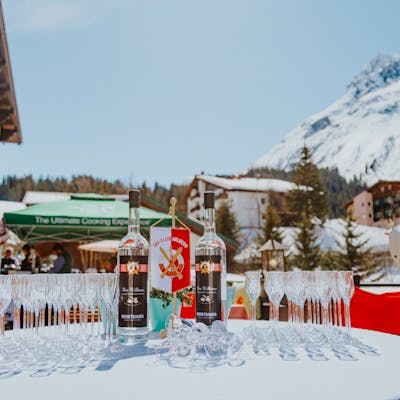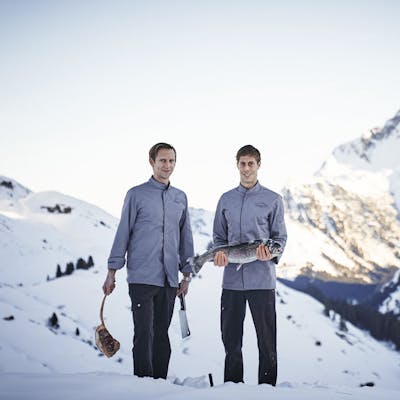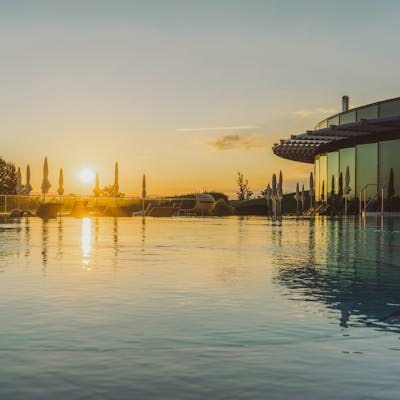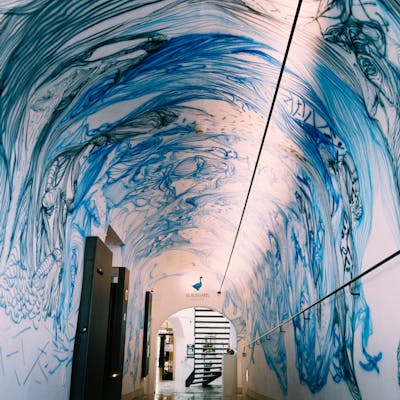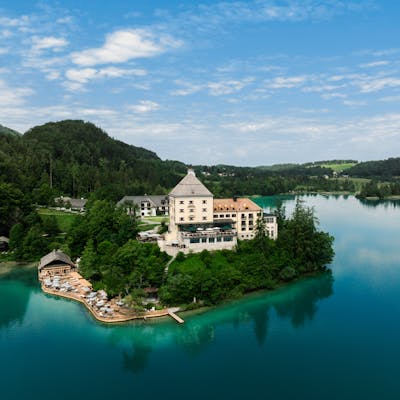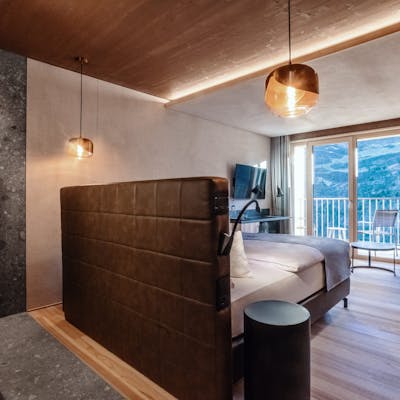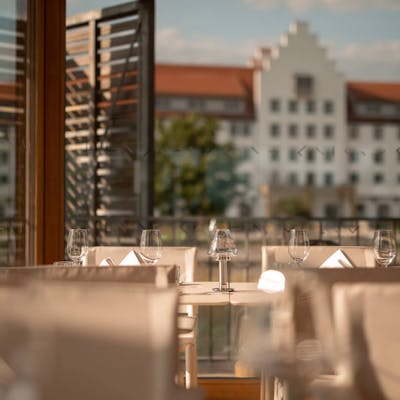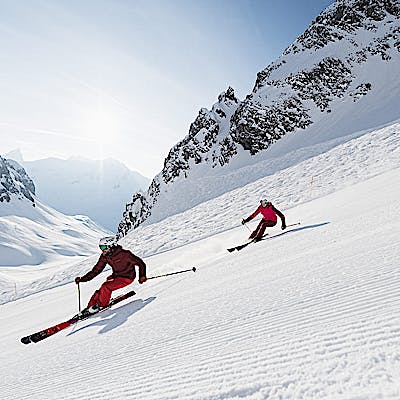

Always in the culinary pole position
Interview with Karl-Heinz Zimmermann

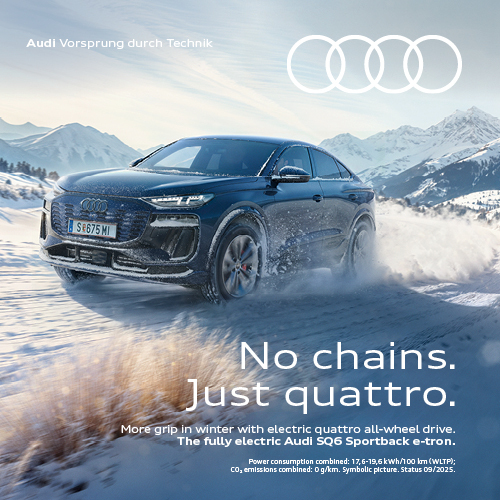
Karl-Heinz Zimmermann knows them all: Bernie Ecclestone, Michael Schumacher or Niki Lauda. As Formula 1 caterer the gastronomer from Lech spent years travelling around the globe and providing the fastest drivers in the world and their teams with culinary delights. Outside of the racing scene, at his inn Alpenblick, he still likes to treat the palates of locals and guests to his excellent Austrian cuisine. Now he has entered well-deserved retirement and plans on running the inn during the winter season and spending the summers travelling and enjoying Lech to the fullest.
L.L./ How does a professional gastronomer and owner of an inn end up in the formula 1?
K.-H.Z./ Before the Lotus racing team approached me with an offer and the idea of having a Formula 1 caterer even took root, the racers and their teams only had home-made sandwiches to eat. I first came in contact with the Formula 1 crowd in 1978, back then stars like Niki Lauda or Walter Wolf were guests at my brother Egon’s hotel. At the race in Monaco in 1987, we brought our own smoked salmon with goose liver and caviar and prepared some of the food right there. To show the people what catering might look like. In the end I suggested to Peter Warr that I might take over catering for the Lotus team, which I did in 1988. From sandwiches to gourmet menus – we cooked and catered from the start. Bernie Ecclestone was sceptical in the beginning but in the end he, too, was convinced. And that’s how a great friendship and long-standing business collaboration came to be, with contracts with Toyota, Bridgestone, Mercedes and the Ecclestone TV stations. In Formula 1 you learn to always be well and thoroughly prepared. It is extremely important to make sure everything is as it should be.


In Formula 1 you learn to always be well and thoroughly prepared. It’s extremely important to make sure every-thing is as it should be.
L.L./ Many people like to romanticise the good old times. But how were the old times? What differences were there, compared to today?
K.-H.Z./ The times were definitely more about contacts. People kept in much closer contact and actually spent time together. We had founded a Formula 1 wine and cigar club. After the third or fourth race in Europe and one time in overseas we’d meet up for a wine evening in groups of 12 to 15 people. The group was quite mixed, but still selected. Just to give a few names: there was Eddie Baker, Patrick Head, Ross Brawn and Charlie Whiting – an illustrious group, really. The cigar club with Niki Lauda would sometimes go on a trip to Cuba where they looked around plantations and cigar companies for three days. An amazing trip. And suddenly things started to become political. All of a sudden you weren’t supposed to sit next to team yellow or team red when you yourself were blue or silver. Over the course of the years more and more people became lone wolves. Michael’s horrific accident also played a part in ending those convivial times. Back when Schumacher became World Champion, we met up at the motor house to celebrate with nice wine, a cigar, and food.
L.L./ Your legendary cannon shot after every one of Schumacher’s victories. How did that happen?
K.-H.Z./ Honestly, I don’t remember. In the year Jacques Villeneuve became World Champion we brought it along for the first time. Bernie Ecclestone was not amused. It was a huge cannon, designed by an engineer and filled with confetti. Add black powder and you got quite the bang. Lots of fun for all involved. Everyone wanted to light it once. A really nice idea, but a bit inconvenient, as the cannon weighed more than 60 kilograms. That’s why the hand support was on there. Schumacher always used to get knocked over the head because the recoil was massive.

People kept in much closer contact and actually spent time together.
L.L./ What was your worst experience on the racetrack and what was the most beautiful?
K.-H.Z./ The death of Ayrton Senna, who was a very good friend, was the worst. It was a shock for everyone. The fact that we had two horrible accidents at the race in Imola, first Roland Ratzenberger and one day later Senna, was devastating. We went to the funeral in Brazil: on that day three million people stood on the side of the road in Sao Paolo, they clapped, sang, and cried. It was a truly moving scene. After that everyone said that Formula 1 without Senna was not the same. But in Canada Michael Schumacher became the next hero and things moved on. There were many beautiful things. Especially the celebrations when Schumacher became World Champion. It was usually in Japan where we decided to have one last big party. The whole family would be there, all German speakers in the Formula 1, like Mario Theissen from BMW and Norbert Haug from Mercedes. And almost all the Formula 1 drivers, too. On the racetrack, of course, they were rivals, but as soon as the engines were silent everyone would get together to celebrate.
L.L./ From the world to Lech: how has Lech’s style, the lifestyle, so to say, changed?
K.-H.Z./ / In the 60s the crowd was very different. It was the post-war generation that had helped build a lot. There weren’t many long-distance travel(ler)s then. Lech was one of the model places in Europe, next to a few Swiss and French towns. Back then the people had a different idea of what holiday meant. They booked their Christmas holidays from December 20 to January 6 – at least – and came back for another 14 days in February or March. And a ski day was organised differently, too. People would ski until teatime at 5 and then dance in their ski boots until 6. Then they’d go home to shower and head out for dinner and to the bars later. Hardly any TV, internet and social media; and no spas, either. There were no such distractions. People were looking to meet other people. It was a proper social life. In the evenings you’d meet up at Scotch Club and again on the slopes the next day. Friendships were forged. Differently from today. Today all the young people do is stare at their phones. In my restaurant I see this a lot: a family with kids who can go through an entire meal without speaking. Even the parents. Everyone is playing with their phone. Maybe they’re sending messages to each other? This is really horrible – the digital dementia. Even before they can say “Good evening” they ask for the Wi-Fi password.

Schumacher always used to get knocked over the head because the recoil was massive.
L.L./ How did Alpenblick come to be?
K.-H.Z./ In summer 1978 my father came to me and said: “Listen, I could buy Alpenblick off of Otto Strolz. What do you think?” And I said that he absolutely had to buy it. After all it was and still is one of the most beautiful spots in Zug. So, by September or October we had the money and then we started renovating the house, which was in desperate need of some work. Really, it was in a horrible state. Among the first guests were Lauda and Rosberg and Nelson Piquet. It was always our goal to offer good food and that was our best selling point.
L.L./ What did you bring back to Lech from your travels?
K.-H.Z./ Travelling broadens your horizon; when you see up close how people live in Japan or Brazil. Or what it’s like when a taxi driver threatens you with a gun because he wants your wallet. You see how desperately poor people in India are while we live in splendour over here. Experiences like that put a lot of things in perspective.

Wordrap with Karl-Heinz Zimmermann
Formula 1 or winter sports? Nowadays winter sports.
My tip for today’s youth… Make sure you find a tough apprenticeship and stick with it.
Were there moments where you were ready to just drop it all? I’ve learned never to give up.
My life as a racetrack…would be similar to the track in Spa, a lot of speed and a number of sharp turns.
My top three dishes…veal liver, Tafelspitz (prime boiled beef), and Stroganoff.
My favourite food…I’m really easy. I like innards and the odd piece of meat.
L.L./ What is it you appreciate about Lech?
K.-H.Z./ First of all its nature and the environment. You can drink the water from a running brook, that’s how clean it is. Where else can you do that?! And the air is wonderfully clean, too. It doesn’t smell and there is no carelessly discarded rubbish. Things are still pristine here. What I also value is the solidarity, even if the word deserves quotation marks. Because if you have your own circle of friends that can also be something that limits you. As for the political angle – there are various trends here but they’re all harmless. We are a town people can earn their money with. Guests still like to come here. Which is why I don’t understand how many people don’t see that. Of course, progress and innovation are necessary, but if you compare us to similar places in France or Italy, you can see that we do have that here, too.

It was usually in Japan where, what with the last race, we decided to have one last big party.
L.L./ You travelled the world, and you know many cuisines and dishes. How come you chose regional Austrian cuisine anyway?
K.-H.Z./ Simply because I have been everywhere. I tried to eat local dishes wherever I went. So, why should I offer fish from the South Sea or lobster from Tasmania when we have so many amazing things here? William Mocatta, a good friend and the former head of the Peninsula Group, lived in my childhood home at Bergfrieden for 18 years with his family. Through his work for Formula 1 we got back in contact and started meeting regularly. When he came to visit, he stayed at Egon’s hotel (Karl-Heinz Zimmermann’s brother, Hotel Kristberg). In the end I asked him how his stay was and his short answer was: “It was perfect but the best part was the farmers’ buffet on Wednesday night. You can find nouvelle cuisine everywhere in the world. But when you come back home you want Austrian cuisine, the way you remember it from your childhood.” And he was right. Many guests who stay in Lech’s hotels ask for down-to-earth fare, the way it’s made here. Simple but good!
L.L./ What was the most adventurous thing you tried abroad?
K.-H.Z./ That was in Mexico, at a restaurant that was away from the hustle and bustle and little known. I asked the hostess to serve something typical and that’s what we got. It looked like cookchafer grub but it really was cactus moth larvae. On another plate there were ant eggs that looked like barleycorns. All that was served with tortillas and avocado cream. It was super tasty but definitely no feast for the eyes.

In the evenings you’d meet up at Scotch Club and again on the slopes the next day.
L.L./ What’s your relationship with Formula 1 and Lech today?
K.-H.Z./ The friendships with Ross Brawn and Bernie Ecclestone are still intact. And there are many more, especially in Formula 1 management, I’m still in contact with. Lech is my home. It’s where I enjoy the brook that runs past the hotel and the nature.
Raised in Lech, Karl-Heinz Zimmermann departed for Australia after his military service in 1970 where he worked as a bar tender and in the local ski school of a winter sports resort. Back in Europe he brushed up his French in France before attending hotel management school in Lausanne. Finally, when he took over the Alpenblick inn in Zug in 1978, his year-long catering engagement with several racing teams and the Formula-1-Holding manager Ecclestone also began. Today Zimmermann lives in Zug (a part of Lech am Arlberg), is retired but still runs the Alpenblick inn in winter.



 Add to Favourites
Add to Favourites




